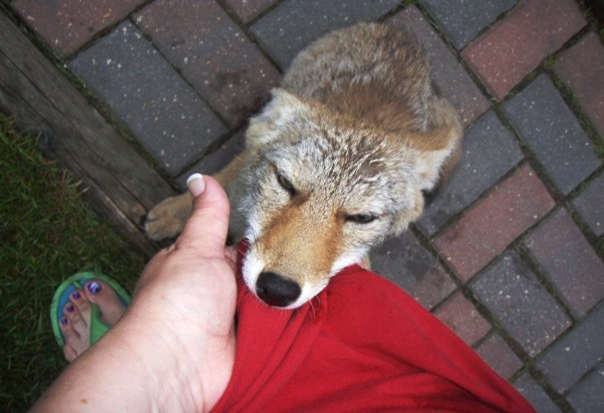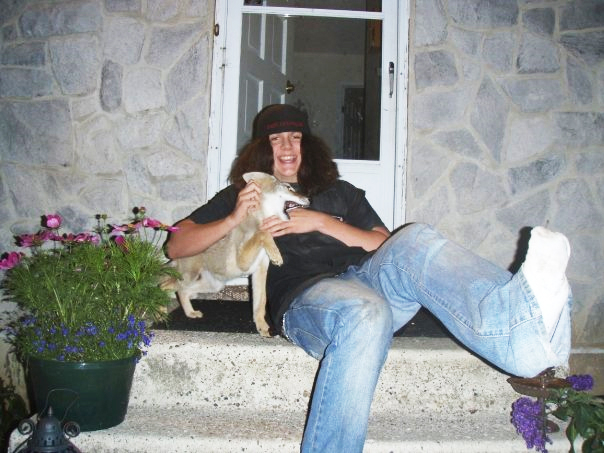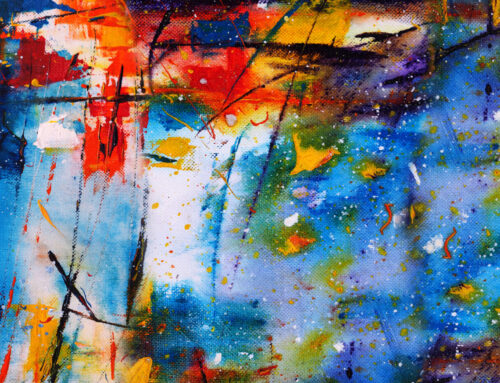Trickster lessons
One morning I stepped outside, and a coyote pup ran up to me and started tugging on my clothes.
I was astounded. Where was this pup’s mom? Am I safe? Was the coyote pup trying to play with me or was it being aggressive? And whatever the answer, I don’t want to touch it and leave my scent on the pup.

The trickster figure is a symbol
The coyote is a trickster figure in many Indigenous cultures. The trickster figure is an archetype, or a symbol, that occurs across cultures and time; there is a universal human interest in tricksters. Tricksters appear differently in different cultures but generally have similar characteristics and behaviour. For example, the trickster figure Puca is rooted in Irish folklore. Puca is a trickster strongly associated with the harvest and the Puca also has shapeshifting qualities. In Irish mythology, if you did not get your harvest in, Puca would spoil it. Puca is also known to take the shape of a horse and take people on a wild horseback ride, and then leave the rider, shaky and scared but unharmed. Loki appears in Norse mythology. Loki was considered the god of mischief, trickery and deception and is also a shapeshifter. Loki cut the god Thor’s wife’s beautiful hair and also changed into a horse. Trickster also has a link to Halloween. The Halloween tradition of wearing a costume, putting on a different persona, has elements of the shapeshifting nature of the trickster. Tricksters are known to scare us or make us uncomfortable but mostly do no serious harm.
You are not in control of everything
In some thinking, Trickster is a story created to help us learn to manage the unexpected and unpleasant. Trickster teaches us about humour as a strength, by playing jokes on us and teaching lessons of humility. Tricksters give us small practice. Trickster nudges us and says with a wink: told you so. Life is unpredictable and plans are just plans. Trickster reminds us—you are not in control of everything.
Life can devastate us in many different ways. We think if we just work hard enough, we can take care of our family. Then we are hurt on the job. (But we are too young for a cane!) Our adult child succumbs to addiction, and we are too old to take on raising our grandchildren. We want our kids to have both parents in their home, a family that lives together, but someone leaves. Our beloved sister gets the diagnosis and is not going to be well ever again.
We and our loved ones did everything we were supposed to do and it happened anyway. We deny—this cannot be happening! We ask: why? We are angry. It’s unfair. It’s not right. We don’t want this. We grieve, we despair. We have no energy to work on the “what now?”. We stay here awhile.
The lessons of acceptance
And then…we stop fighting, stop denying reality. We take a peek around the wall we have been pounding. We find the will to pick up our crying, crumpled self. We accept the new deal.
And we see the crack of light in the dark, some possibilities, find some meaning in what has happened to us. We take a step or two down our new path. We keep moving. If we can, we rest when we need it.
And coyote? He startled me, I didn’t know what to do and I was scared of a nearby mother. But when my son came out and sat on the step to see the pup, to our surprise, the pup jumped up on him to play. He knew humans well. Later, we learned the friendly coyote was (sadly) a failed attempt at reintroduction to the wild, after the pup was orphaned and raised with humans.

Trickster lessons
Trickster taught me: you will have an unexpected encounter this morning. You will be startled, a little scared and a little amazed. You will figure it out.
Greenwich Counselling Services
Stony Plain



